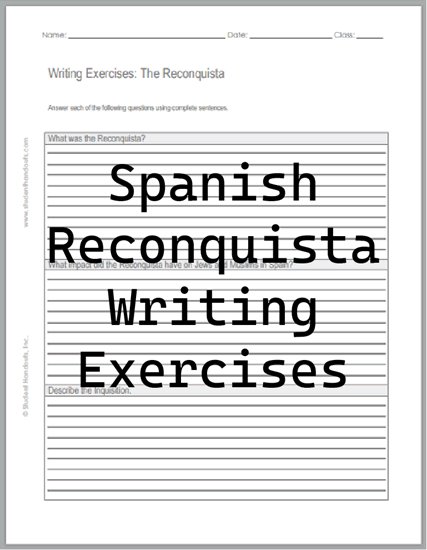| Spanish Reconquista Writing Exercises |
|---|
| www.studenthandouts.com ↣ World History ↣ Age of Exploration ↣ Age of Exploration Worksheets |
 |
  |
|
Answer each of the following questions using complete sentences.
1. What was the Reconquista? The Reconquista was a centuries-long series of military campaigns by Christian kingdoms to reclaim the Iberian Peninsula from Muslim rule. It began in the early 700s and ended in 1492 with the capture of Granada by Ferdinand and Isabella. The Reconquista significantly shaped Spanish identity, promoting Christian unity and laying the groundwork for religious persecution and overseas expansion. 2. What impact did the Reconquista have on Jews and Muslims in Spain? The Reconquista led to severe consequences for Jews and Muslims in Spain. After the Christian victory in 1492, Jews were expelled unless they converted to Christianity, and Muslims soon faced similar pressures. Many were forced to convert, flee, or face persecution under the Spanish Inquisition. This religious intolerance disrupted communities, ended centuries of coexistence, and weakened Spain's cultural and economic diversity. 3. Describe the Inquisition. The Inquisition was a powerful religious court established to identify, try, and punish heretics, especially those accused of secretly practicing Judaism or Islam after converting to Christianity. It began in the 15th century in Spain under Ferdinand and Isabella. The Inquisition used interrogation, torture, and public punishments, including executions, to enforce religious conformity and strengthen Catholic authority, leaving a lasting legacy of fear and repression. Click here to print. Answers will vary. |
| www.studenthandouts.com ↣ World History ↣ Age of Exploration ↣ Age of Exploration Worksheets |








